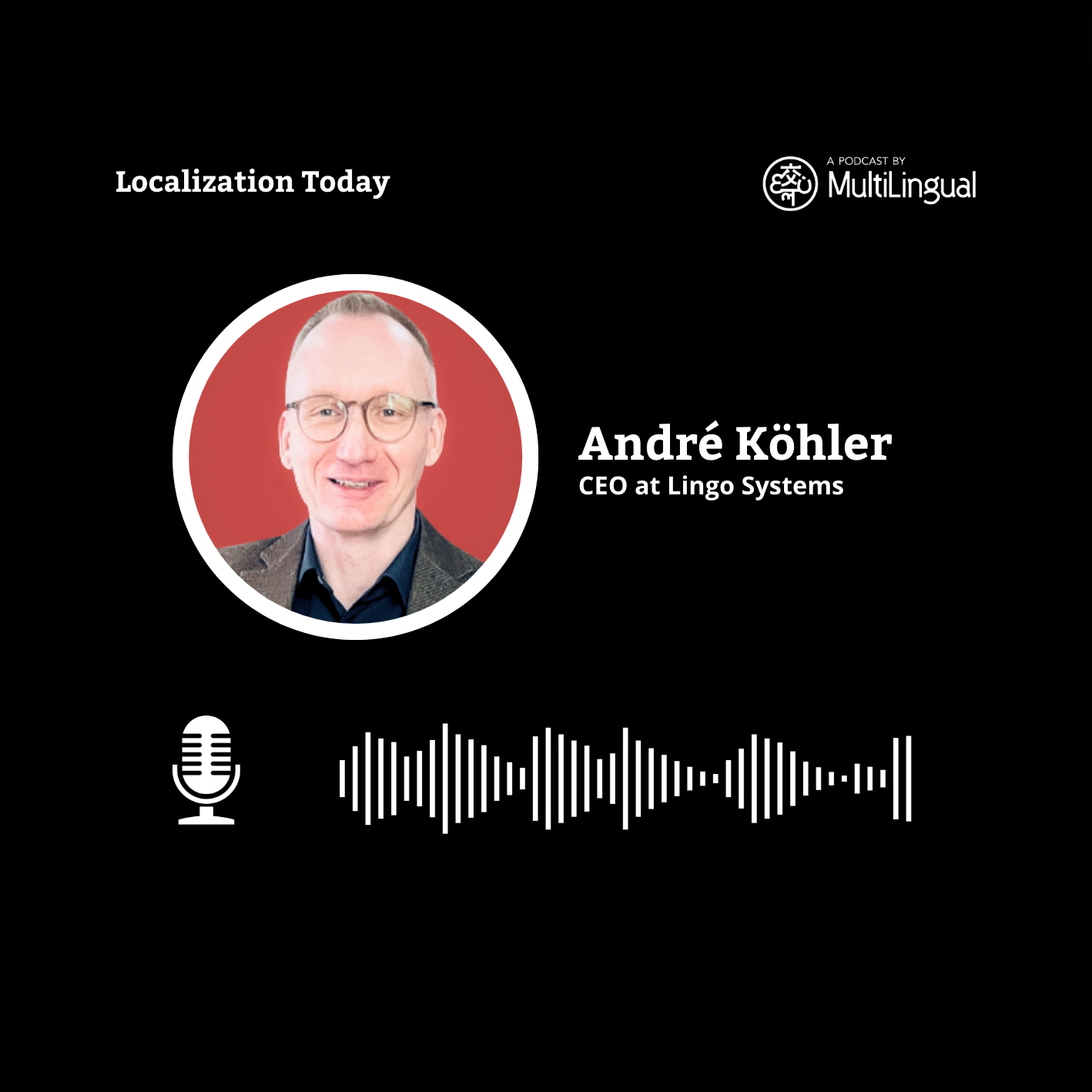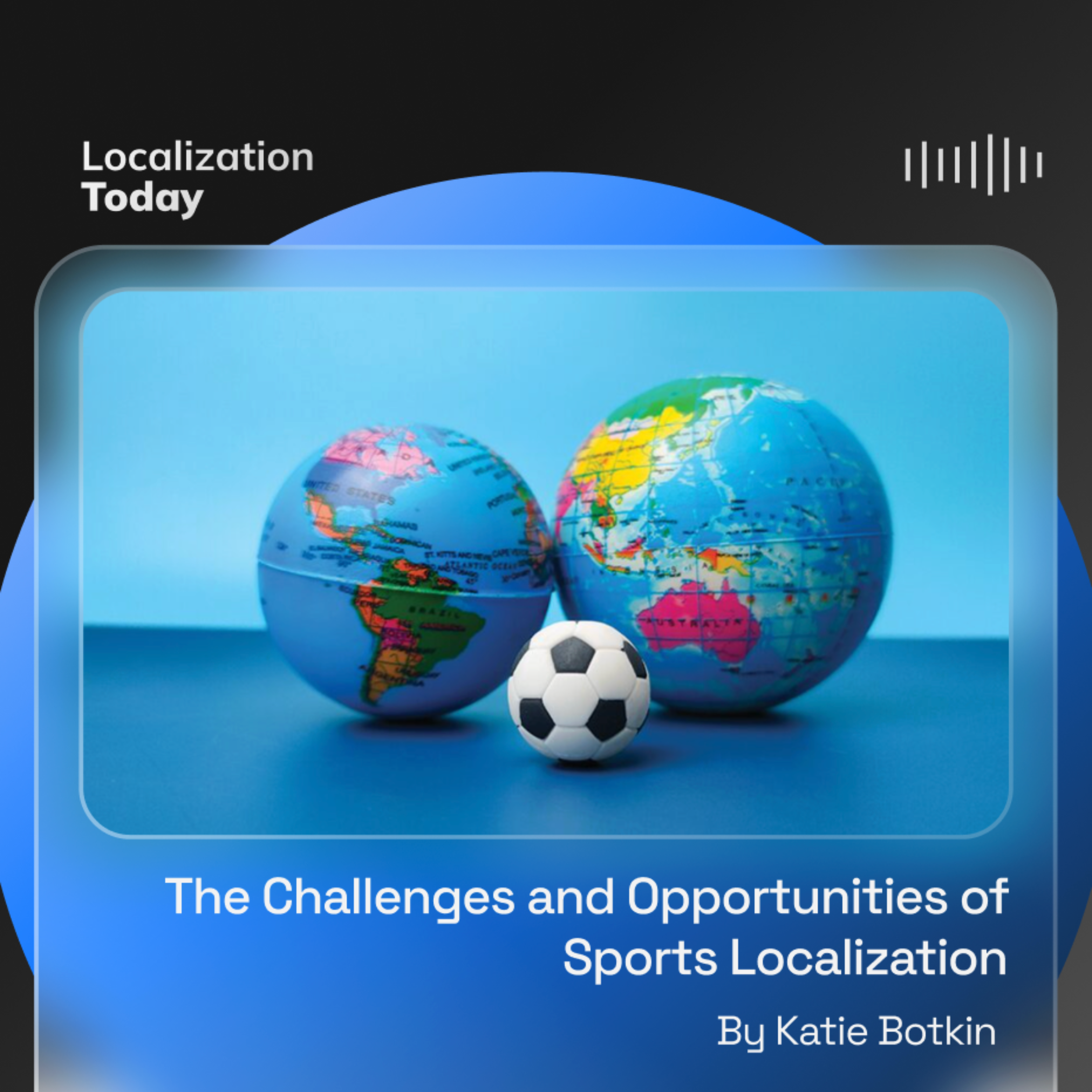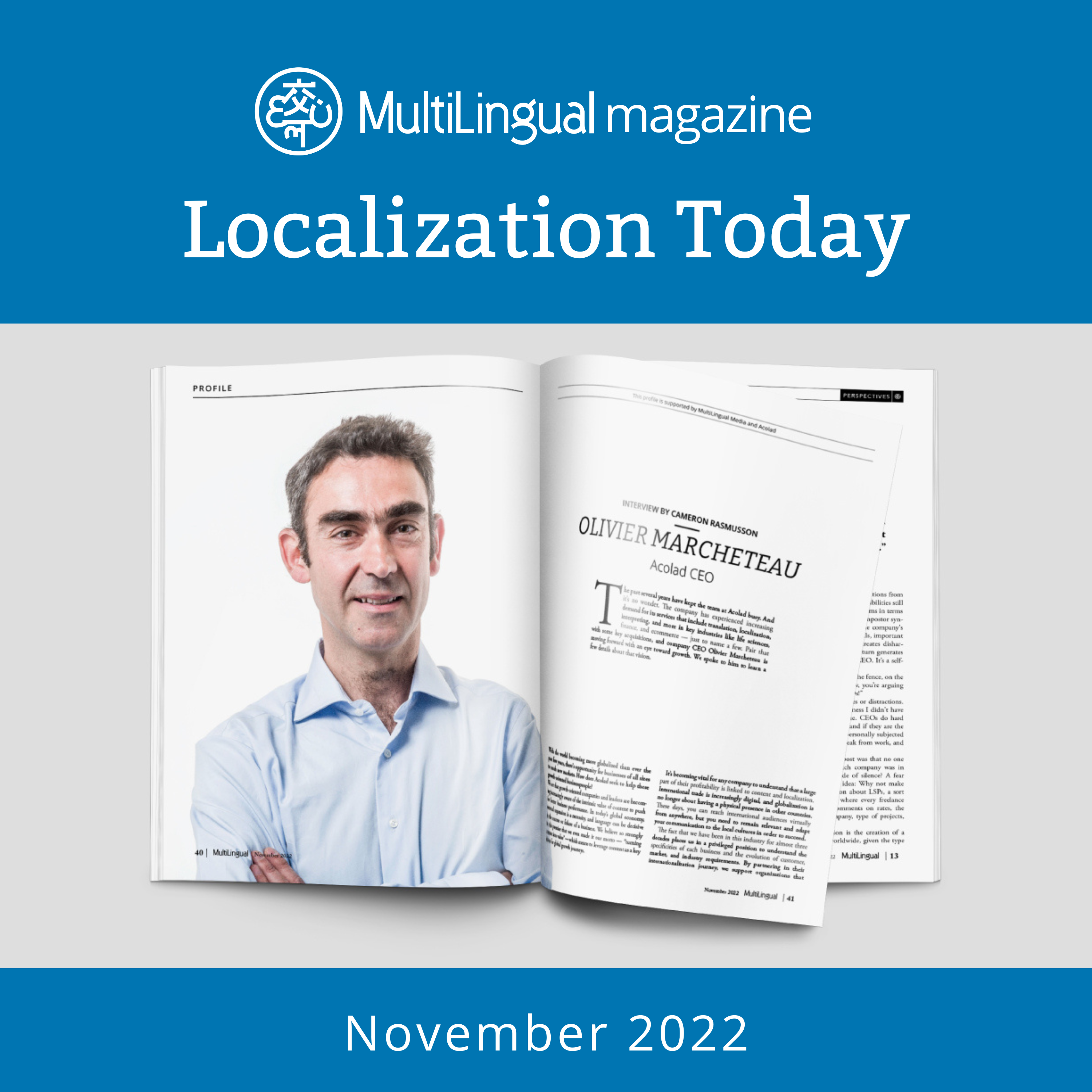Episode Transcript
[00:00:00] Speaker A: Foreign My name is Hristina Deutschynova.
I am a language industry advisor in addition to my day job as a communications and events manager.
I come from Macedonia, but I'm currently based in Montreal. And in the language industry, I consult for a local company called BG Communications.
[00:00:31] Speaker B: And thank you so much for doing this. Off the record, we were. Or off the recording, we were talking about your experience with associations, your experience in Macedonia, and how you came over to Canada. Could you tell us a little bit more about that story?
What happened with the association, why was it important, and where you are today?
[00:00:52] Speaker A: Thank you so much for that question. And yeah, I have a degree in interpreting. I was part of the first generation of professionally trained interpreters in my country in Macedonia. And I have to say that it was one of the best decisions that I could have taken in terms of my profession, career, and in my life because it connected me to an industry that I respect, that I'm still very much connected to, even though I don't do interpreting and translation today. But back in the day, when I was a student of interpreting and later on when I graduated, I was looking for a professional organization to turn to and ask for professional advice on how to get settled in the career. Unfortunately, apart from Literary Translators association, there was no professional association catering for the interests of the professions of a translator and interpreter.
So together with a group of colleagues, we decided to establish one. We invited renowned university professors and translators to join us. And there was a dozen of us that put together the initiative to establish the Macedonian Translators association, which later on got joined by the Conference Interpreters Association. So it is all now under one title, which is the Translators and Interpreters association of Macedonia. So the process was not easy to convince people not for the fact that we need to be united when it comes to, you know, offering the same conditions and the same prices to our clients, but also to work by the standards of the profession, to cater for the professional development of our peers, to get organized around annual events and training seminars, and just to raise the image and the reputation of the profession, because oftentimes in my country, people are lucky to have good language skills. So everybody picks up English easily, let's say, and they see sometimes translation as something they do on the side, you know, so they're a lawyer or financial advisor, but they speak. Speak good English, so they pick up projects here and there, thereby ruining, you know, the situation for the rest of the people who do this professionally and as an actual career. So in that regard, the association has been quite successful because once it got established, it attracted the critical mass of translators in the country, and that number has now gone over 15 times what we had as founding members. We've had successful annual conferences on various topics, covering standards, ethical aspects of the profession, any challenges that we are facing in our daily lives as translators and interpreters and so forth. So for me personally, once I moved to Canada, I stopped doing translation and interpreting because the demand was really low. However, Covid changed all of that because all of a sudden, it didn't matter where you're located in the world. You could join in, hop on a zoom link from anywhere and do remote interpreting, or you could also translate, just like it was possible before, and communicate with clients online. So I have to say, in that sense, Covid has been really beneficial for me to get reconnected to some of my old clients, but also to come across new ones. What happens today is I remain committed to my, you know, association because I feel like it was one of my very personal projects too, to push and to realize. I try to get active. Around the time when we organize annual conferences, I invite speakers who are relevant on the world, a translation, localization, interpreting stage, and then they would come to Macedonia to share their knowledge and expertise for their local colleagues. Additionally, I also like to be active in the cultural diplomacy aspect and promoting the role of the Macedonian language, the fact that it is spoken by possibly more people that live outside the country than inside the country at this point, because of the heavy immigration flows and waves in the last few years.
Here in Montreal, I remain connected to the language industry by active participation in the Canadian Language Industry association via the company that I work as an advisor for BG Communications, staying active by organizing the annual events of the Canadian Language Industry association, attending events like the Gala conference and Women in Localization. At one point, I was the event manager for the Eastern Canada chapter and successfully organized a series of events. But it became too demanding with my other, let's say, nonprofit, voluntary roles, and I had to focus more on my personal life and family.
[00:06:07] Speaker B: And thank you so much for sharing this context and we'll talk about technology in just a little bit. But of course, there is an impact that associations have for those listening. Once again, we are here in the context of GALA 2025 in Montreal, Canada.
Tell us a little bit more from your experience as a practitioner, as an interpreter. What have associations given you that have allowed you to do your craft and to evolve in the work that you do as an interpreter in the language industry?
[00:06:43] Speaker A: Absolutely. It's all about knowledge sharing. So as an association. We come stronger as a united front in front of our clients. We stand behind the same standards of the work and we also. I'm not going to say we get aligned on pricing policies, but we agree on what the minimum should be to have a respected work and respectful income as a profession. When it comes to knowledge sharing, obviously one of my favorite parts being associated to the Macedonian Translators and Interpreters association is having organized the annual conferences during which it is possible to do the transfer of that knowledge by inviting internationally renowned experts and also learning a bit more about how the industry evolves beyond our shell, beyond our country, and being open to applying some of those practices on the local market.
[00:07:41] Speaker B: Let's talk a little bit about technology. And of course, since it's now an understatement to say let's consider technology, but considering technology and considering the advancements in machine learning and evolution of the uses of technology within the industry, what are some of the concerns you have, but also what are some of the hopes that you are holding given the whole evolution?
[00:08:08] Speaker A: Just like you said, it's impossible to think of not just translation or the language industry, any industry at this point, without associating it to the technology related to it, or also its co dependency, if you will. It's impossible to imagine that you can do translation nowadays without having any experience with the CAD tools, translation memory tools, all of the various tools out there that you can use to speed up your translation process. But as of late, the process of machine translation, post editing has obviously evolved and has affected the work of translators in a positive manner in the sense that it makes their work more efficient, faster. And that's on the benefits side when it comes to the Literally, what we discussed yesterday in terms of AI, even in this industry could be already irrelevant today. But I see the use of AI mostly in a beneficial sense. I don't think that we will be replaced by AI. I still see the human in the center of the translation process if we want to look at quality and actually useful outcomes and not something that would just produce translation errors, God forbid, injuries with automated translation used on work manuals, for example. So the challenge obviously is not getting completely pushed out by technology, but I don't see that happening anytime soon. And I may sound ridiculous if a new revolutionary technology comes out by the end of the year that says, you know what, we really do not need the human at this point. But that's when it comes to translation, when it comes to interpreting, I think we are far, far more, let's say, distant from the Point where interpreting could fully be done by AI. Sorry, Kudo.
[00:10:18] Speaker B: And I understand. Thank you so much for sharing that, because that is the biggest conversation, which is, how soon will that happen? But there are so many elements of culture, and we've been discussing this around the conference, that are very difficult for machines to get because they come from human understanding on the cultural nuances. So could you tell us from, of course, your training and the work that you have done, what are some of those things that make interpretation a harder place to make these technologies, quote, unquote, replace humans? It would be more. It would make humans adapt their roles. So what are some of the things that you've seen interpreting that allow for this to be the dynamic?
[00:11:02] Speaker A: So mention three things. Obviously you already mentioned one, and that's the cultural sensitivity. AI still has a long way to go to grasp the entirety of the human history. Cultural interactions between countries. I call them cultural interactions, but we can also call them political disputes or wars or nuanced meanings that I don't think that can be captured that easily by automated interpreting. The other thing which I think to a certain extent AI is becoming more successful at, is capturing the tone of voice, which is extremely important to portray and to reflect in the rendered interpreting.
Lastly, one of the most difficult aspects to interpret is humor. It remains to be humor because it encompasses much more than the rendering and the correct meaning of the idea behind it. And you also have to do it in a way that will be applicable in the target language. So those are my three takes on why AI could not be used to fully replace human interpreting.
[00:12:09] Speaker B: Thanks for your perspective, Ann. I want to get a little bit into business just to end up the conversation. But another conversation in Gala has been, how are teams going to differentiate what they do? Seems like a lot of companies are doing very similar work.
What are going to be the key differentiators in the upcoming years for companies that are in our line of business?
[00:12:34] Speaker A: I thought about this yesterday when I was walking around the exhibition booths at Gala, seeing the overlap in technology that various colleagues offer, seeing how far they've come in perfecting their tools and offering them to their clients. So what I think will be the factor of differentiation is actually the human element again, customer service. How well you connect with the people, how well you understand what you're offering them, how well you can respond to their calls for need, or rather the responsiveness of your customer service side, if you will. So the customer experience aspect is what I think will make the impact on which technology you choose, not the actual quality of the technology.
Last but not least, I think that there is room at the table, or at the top, if you will, for everyone. And I always trust that there has been healthy competition in the language industry and I think that will continue to be the case.
[00:13:31] Speaker B: Excellent. Thank you. And of course, I couldn't leave without giving you an opportunity to send a message out there to those that have worked with you in associations before, but even also the people that you work with. Any final thoughts or messages that shouldn't be left unsaid.
[00:13:49] Speaker A: Absolutely. And thank you for saying that. Because we sometimes forget or overlook where we started, where we are now, and what happened in between.
I'm really grateful for all the door openers that I've had in my career right from the beginning up until this point. And I feel like I should mention three women who have made significant impact on my career path with their kind recommendations, guidance and mentoring in the process.
That would be my professor of English at university level, Emilia Georgievska, who was so kind to recommend me to the first company that gave me a job in Macedonia, then the managing director of that said translation company, the Congress Service center, that has meanwhile grown to be a major center for event management, conference management, and also publications in the literary sector, translation of literary works. That's Vesna Miceva Todorovska, who is a pioneer on the Macedonian market with her ideas, with her understanding of business and how it has no limits. And finally, a big thank you to Maryse Benhoff, who is one of the key figures in standardization in Canada. And I was lucky enough to be introduced to her by Doug Lawrence, who is on the British Standardization Institute Standards Committee, pretty much to ISO. And Maris literally opened the door to my career in Canada, but also opened my eyes on many topics that I didn't have an established position on, even though I had been in the language industry for a very long time. So even though I'm now delving into different waters of communication and events expertise, I always look back to my language industry experience and stay connected to it because I think it brings a lot of values. And people in the language industry are also really, really nice. I don't know if you've actually noticed that. That said, I have always tried to replicate the type of experience that I have had and have tried to be a mentor to younger colleagues, open doors for them and make sure they're on the right path by offering, whether it be terminology advice, career advice, or being there as a friend.
[00:16:24] Speaker B: Thank you so much for joining us today.
[00:16:27] Speaker A: Thank you, Eddie. The pleasure was mine.
[00:16:29] Speaker B: And this was our conversation with Cristina Doijinova, with VG Communications. We talk about the Macedonian history in associations, the effect that associations have in our industry. Translators, interpreters and. And linguist. And what the future holds for interpreters from the perspective of Christina. My name is Eddie Rieta. I'm the CEO here at Multilingual Media. Thank you so much for listening. Goodbye.


